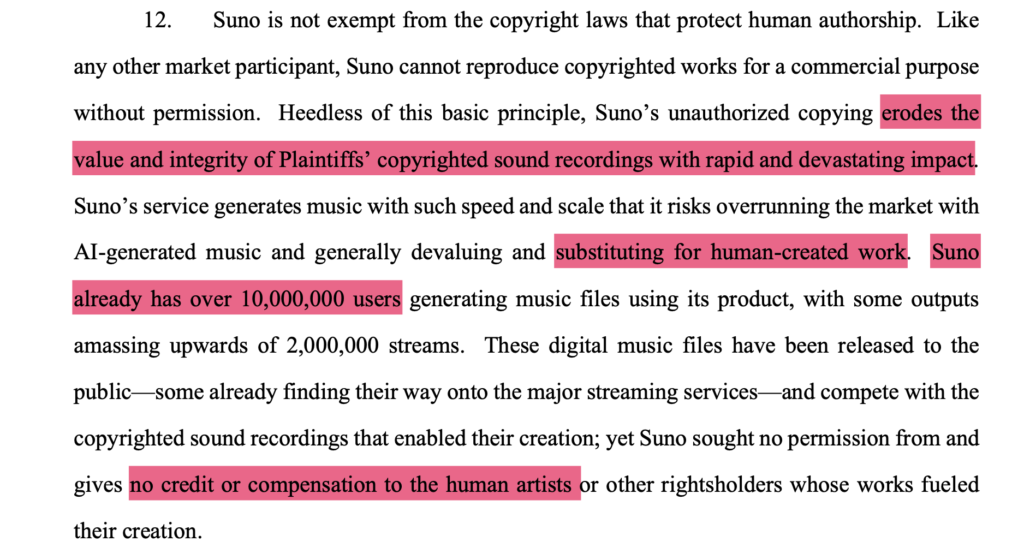This complaint is very similar to the Udio complaint. I will address different points. Suno is the first Music AI platform I started testing last month. Others including Udio followed through word of mouth. Prior to May, there were no viable music AI platforms according to professional standards, but Suno’s latest version opened the floodgates of creativity – the industry mentions 10 new songs a second on Suno alone – and there are already a good few dozens of platforms quickly catching on.
In a way, everything we may say now about AI is at a very early stage of training, building, debugging and adjusting and is evolving as we speak through the invaluable input of millions of user pioneers. We are seeing progress unfold at the speed of light before our eyes. Everyone is learning, AI is learning and countless users who never made music in their lives are also learning about making music, with each platform providing valuable tips and tricks. There is a process of demystification and breakdown of loops, beats, melodies, and vocal flows in different languages, as well as deconstruction and re-appropriation of the music production process. It brings tears to my eyes to see so many users become creators instead of passive consumers.
Many users throughout platforms mention that since AI came along, their favorite songs are the songs they made themselves. This is fantastic for humanity. Obviously, these users have now less time to listen to commercial songs. Until now, we had to listen to everything the industry imposes on us, because there was no alternative to learn from, other than public domain. It was time-consuming, frustrating, and depressing due to violent, reductive, and misogynistic lyrics and systemic undue sexualization and dehumanization of artists by the industry. Now that AI listens to these commercial “hits”, we can protect our ears while focusing on more productive things that bring us joy. In a way AI doesn’t do anything more than we’d be doing without AI, but AI saves us time and protects our emotional well-being and integrity by ingesting and filtering the trash the industry throws at us, so that we can minimize our exposure to harmful content.
Can the music industry really stop progress and continue keeping AI for themselves?
In both complaints we see that the platforms refuse to disclose what data they trained their models on. They claim it is proprietary information. The reasoning behind refusing to disclose training particulars may be that anything related to training is a trade secret and training in itself is fair use.
Ideally a LLM should have no restrictions regarding training and they shouldn’t pay for data that is publicly available. Copyright law specifically provides a training / education exemption under its fair use doctrine which may differ from one country to another, but essentially recognizes that non-commercial and transformative activity which is good for humans and society in general justifies limiting the ability of rights-holders to derive profit from copyright. Without fair use exceptions, there would be no journalists, no standup comedians, no content creators, no Youtube or TikTok, no parodies, no criticism (i.e. pop art), etc.
I can certainly copy an entire song to break it down and learn how it was made note by note. Why can’t AI? When I need to learn a music video choreography, I copy entire videos from the internet, I break them down into sections which I then further copy (several times per section, slow then normal speed) into a myriad of little video tutorials that I watch a million times until I get the moves right. While I learn the moves, I reproduce these moves with my own body which I film (another countless times) and edit into new videos. This is a 100% fair use example (and btw it’s true, I do that every day). Why can’t AI do the same with music? What’s the difference? Why does it stop being fair use when AI does the copying for the purpose of training rather than a user trying to learn a song or a dance?
It seems that both complaints put much effort in proving that the LLMs copied entire songs for training. They are not really denying it. Training is clearly a transformative process. I think what the fuss is revolving around is whether there is such a thing as “excessive training” that should be excluded from fair use defenses.
In Para. 12, the plaintiffs suggest that music generated on AI platforms is NOT human-created work! This is a strange insult to millions of human users. I’m pretty sure this qualifies as hate speech. Last time I checked, I am human and I write my own lyrics. Yet another lowly and unfounded attack. Why do they think they are the only humans in the room. WTF!
Due to the dehumanizing characterization of human users as non-human, I am not going to read the rest of the complaint. Sorry, but I can’t deal with more hateful content. Not on Canada Day. I’ll let my bot finish the job but I won’t publish the result.
